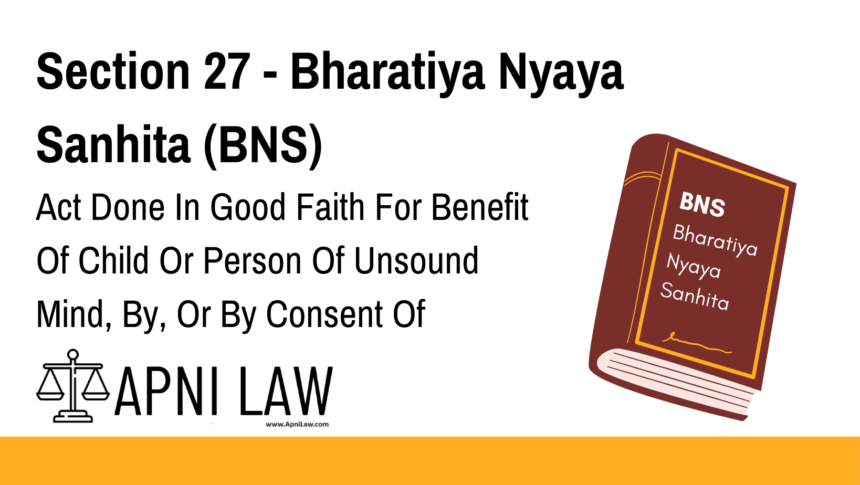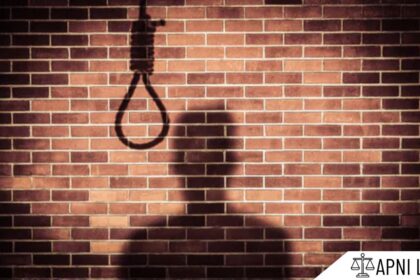Code: Section 27 BNS
Section 27
Nothing which is done in good faith for the benefit of a person under twelve years
of age, or person of unsound mind, by, or by consent, either express or implied, of the
guardian or other person having lawful charge of that person, is an offence by reason of any
harm which it may cause, or be intended by the doer to cause or be known by the doer to be
likely to cause to that person:
Provided that this exception shall not extend to––
(a) the intentional causing of death, or to the attempting to cause death;
(b) the doing of anything which the person doing it knows to be likely to cause death, for any purpose other than the preventing of death or grievous hurt, or the
curing of any grievous disease or infirmity;
(c) the voluntary causing of grievous hurt, or to the attempting to cause grievous
hurt, unless it be for the purpose of preventing death or grievous hurt, or the curing of
any grievous disease or infirmity;
(d) the abetment of any offence, to the committing of which offence it would not
extend.
Illustration.
A, in good faith, for his child’s benefit without his child’s consent, has his child cut for
the stone by a surgeon knowing it to be likely that the operation will cause the child’s death,
but not intending to cause the child’s death. A is within the exception, in as much as his
object was the cure of the child.
Explanation of Section 27 BNS
Section 27 of the Bharatiya Nyaya Sanhita (BNS), 2023 provides legal protection in cases where:
- The act is done in good faith and solely for the benefit of:
- A child (minor below 18 years).
- A person of unsound mind (who is incapable of making rational decisions).
- The act is performed by their guardian or with the guardian’s consent.
- There is no intention to cause death.
Key Highlights:
✅ Acts must be done with honest intentions for the welfare of the child/person.
✅ The guardian’s consent is essential, except in life-saving emergency situations.
✅ Legal immunity is provided, unless gross negligence or malice is involved.
🔗 Also Read: Section 26 BNS – Acts Done by a Person Justified by Law
Illustrations of Section 27 BNS
Example 1: A Life-Saving Medical Operation
A doctor performs surgery on a child suffering from a critical illness, with the parents’ consent. Even if complications arise, the doctor is protected under Section 27 as the act was done in good faith and for the child’s benefit.
Example 2: Emergency Medical Treatment for an Unconscious Patient
A hospital administers emergency treatment to an unconscious mentally ill person, as waiting for consent could risk their life. Since the act is done in good faith for the patient’s benefit, it is not considered a criminal act.
Example 3: A Guardian Deciding on Mental Health Treatment
A father admits his mentally ill son to a rehabilitation center for treatment. Since the father is the legal guardian and the act is for the son’s benefit, no legal liability arises under Section 27.
🔗 Also Read: Section 30 BNS – Acts Not Intended to Cause Death
Common Questions & Answers on Section 27 BNS
1. Can this section protect doctors performing life-saving treatment on a minor?
✅ Yes. If a doctor performs an emergency procedure with guardian consent or in urgent situations, they are protected under this section.
2. What if a guardian refuses consent for a necessary act?
✅ If the act is essential for the survival or well-being of the child/person of unsound mind, the Court may intervene and authorize the act under legal provisions.
3. What if the act unintentionally results in harm?
✅ If the act was done in good faith and for the person’s benefit, no criminal liability arises unless there was gross negligence.
4. Does this section apply to mental health treatments?
✅ Yes. Guardians can authorize treatment for individuals with mental illnesses if it is for their benefit and done in good faith.
🔗 Also Read: Section 28 BNS – Consent Given by a Person Under Fear
Conclusion
Section 27 of the BNS, 2023 provides legal protection for acts done in good faith for the benefit of children or persons of unsound mind, provided they are performed by a guardian or with their consent. It ensures that essential care and decisions can be made without legal repercussions, as long as there is no intent to cause harm.
📢 For more legal insights, visit ApniLaw! 🚀








